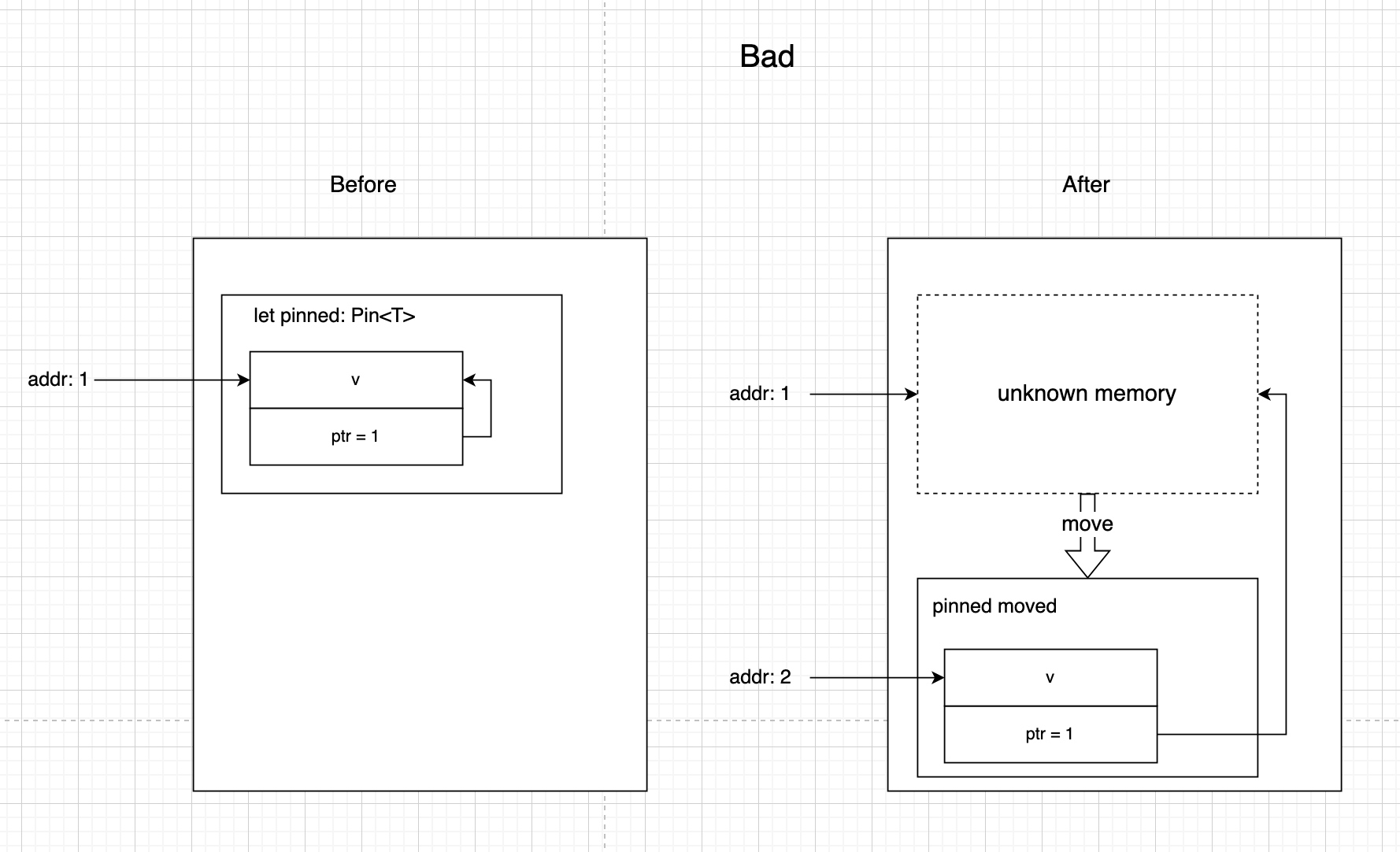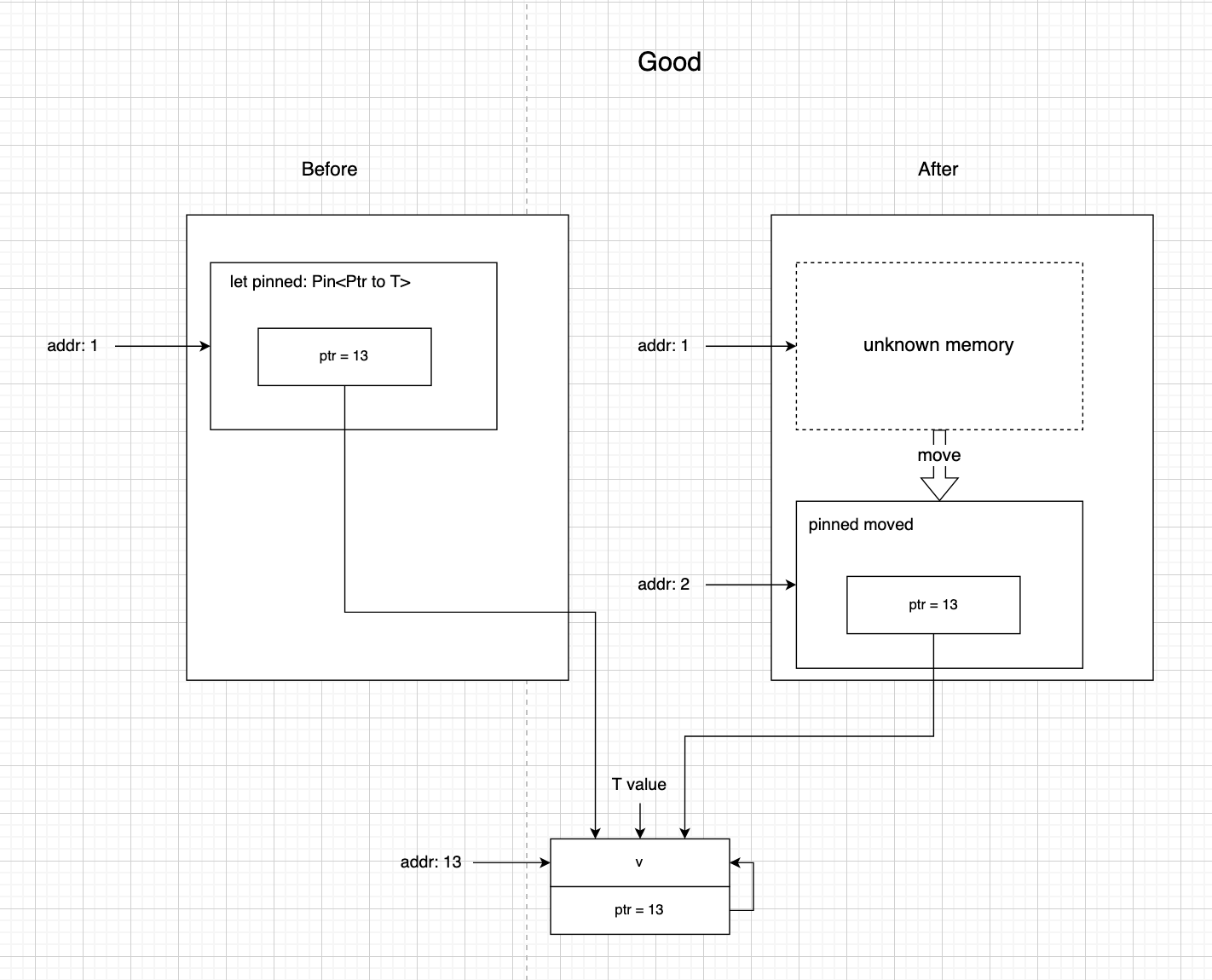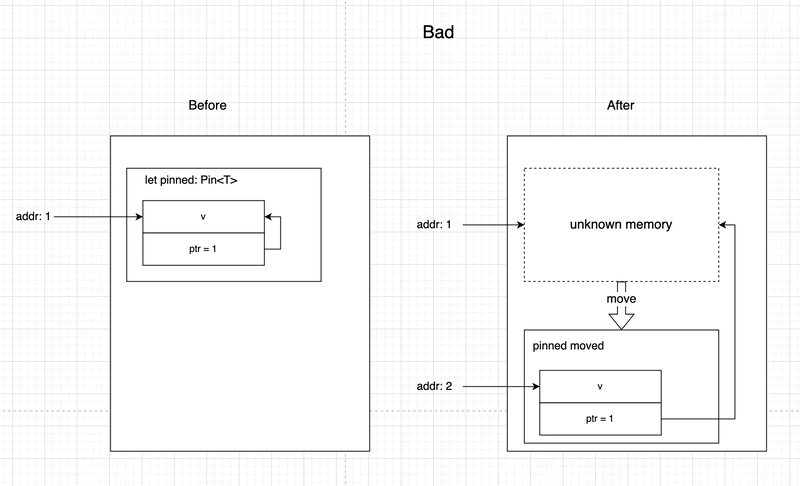Pin is a complicated concept for Rust beginners because it's too abstract. But is's also the cornerstone of async Rust. Now I'm going to introduce Pin in following parts:
- Why Pin is needed
- What is Pin
- The essential of Pin, implement a basic MyPin
Why Pin is needed
The danger Self-Referential struct
In Rust, there's a particularly dangerous kind of data structure called a self-referential structure. This refers to a struct that contains a reference or pointer to another field within itself.
An object can move in memory freely, but its internal pointer will not be updated accordingly, still pointing to the old address, breaking the structure, causing undefined behavior.
For example (I'll use pointer instead of reference to avoid lifetime, for simplicity):
#[derive(Debug)]
struct SelfRef {
v: String,
ptr: *const String,
}
impl SelfRef {
pub fn new(v: String) -> Self {
Self {
v,
ptr: std::ptr::null(),
}
}
pub fn correct_ptr(&mut self) {
self.ptr = &self.v;
}
}
fn create_self_ref(v: String) -> SelfRef {
let mut res = SelfRef::new(v);
res.correct_ptr();
res
}
fn main() {
let a = create_self_ref("hello".to_string());
println!("{}", unsafe { &*a.ptr });
}In SelfRef, the ptr will point to v, so it's self-referential. And the code will crash because we set the ptr to the address of v in create_self_ref, now everything goes well. But when the function returns res to main, res would move to another piece of memory. However, ptr did not get updated, still pointing to the old address which has been freed. So the program crashed when dereferencing ptr.
We may write very few self-referential structs, but in async they're ubiquitous. If you're not familiar with async, here is a basic introduction.
The essential of async/await
async/await is a syntax sugar. It will be compiled to a state machine.
async fn self_referential() -> i32 {
let x = String::from("hello");
let x_ref = &x; // create a reference to x
// put an await to get a state machine
dummy_future().await;
// use the reference after await, which will introduce a self-referential future
x_ref.len() as i32
}would be compiled to pseudo code:
enum SelfReferentialFuture {
// initial state
Start,
// waiting dummy_future to be ready
WaitingOnDummy {
x: String,
x_ref: *const String,
dummy: DummyFuture,
},
// final state
Done,
}When a reference is used across an await, a self-referential future will appear, because all these variables must be stored inside the future. If the future moved during poll, any internal reference would become invalid, leading to undefined behavior.
So that's why we need Pin to prevent futures from moving, and why the poll function takes a Pin<&mut impl Future> instead of &mut impl Future:
fn poll(self: Pin<&mut Self>, cx: &mut Context<'_>) -> Poll<Self::Output>Pin/Unpin
First, it's important to clarify one point. For a value with type T, if you want to move it, you must have a &mut T. If you have no way to get a &mut T, you're not able to move it.
Then let's go through Pin/Unpin.
pub struct Pin<Ptr> {
pub __pointer: Ptr,
}
pub auto trait Unpin {}Pin is a struct with a pointer type field Ptr. Pointer type means it has Deref trait, such as Box, Rc, Arc, &T, &mut T, etc. It must store a pointer to T instead of direct T, because if T is store directly in Pin, when Pin moves, T will move together. But if Pin stores a pointer, it's totally fine for the pointer to move around with Pin.


Unpin is an auto trait. If all the fieldsof a struct implement Unpin, then the struct itself will implement Unpin automatically. Everything is Unpin by default, including our SelfRef.
Unpin means the struct is not sensitive to being moved. It does not care if it's moved at all. Unpin does not mean if it's movable, or not movable. In Rust, every type could move. Unpin means even if it's wrapped by Pin, user could still get &mut T by Pin::get_mut and move it. Only types with !Unpin is not allowed to move by the type system of Rust.
Obviously SelfRef is sensitive to being moved, so we need to remove Unpin for it manually.
In nightly Rust, we could do like this:
impl !Unpin for SelfRef{}But impl !Trait is still an unstable feature. In stable Rust, we need to use a marker field:
struct SelfRef {
v: String,
ptr: *const String,
_pin: PhantomPinned, // marker
}PhantomPinned is a struct provided by std::marker. It has implemented !Unpin internally, so SelfRef will not implement Unpin.
Pin<&mut T> or Pin means either
-
Twill not move T: Unpin
If T: Unpin, it does not care if it's moved, and the protection by Pin<&mut T> is meaningless. It's useful when we explore methods from Pin.
The essential of Pin
The essential of Pin is rather simple. It has no any magic. Imagine if we don't have Pin from std. For SelfRef, we hope it could not move. How could we achieve that? The easiest way is to put it to heap, then hide it inside another struct.
// crate 1
pub struct MyPin<Ptr> {
ptr: Ptr,
}
impl<Ptr: Deref> MyPin<Ptr> { // Ptr should be a pointer type
pub fn new(ptr: Ptr) -> Self {
Self { ptr }
}
}
// crate 2
let sr = SelfRef::new("hello".to_string());
let mut boxed = Box::new(sr);
boxed.correct_ptr();
let my_pinned_sr = MyPin::new(boxed);That's all. We're done. When you type my_pinned_str. in editor like VSCode, there is no hint. MyPin has no public fields or methods. sr is hidden in MyPin, and we have no way to access it, so it cannot move.
Please attention that we called boxed.correct_ptr(), because Box::new(sr) would move sr from stack to heap. We need to fix the pointer after the move.
The basic version has indeed achieved the prevention of movement, but it's sort of meaningless. We don't have access to sr at all. Is there any way to access it? Just like those smart pointers, we could implement Deref for it.
impl<Ptr: Deref> Deref for MyPin<Ptr> {
type Target = Ptr::Target;
fn deref(&self) -> &Self::Target {
self.ptr.deref()
}
}
impl SelfRef {
pub fn say_string(&self) {
println!("My value is: {}", self.v);
}
pub fn correct_ptr(&mut self) {
self.ptr = &self.v;
}
}
// duplicate code omitted
my_pinned_sr.say_string();
println!("{}", my_pinned_sr.v);Now we could access fields of my_pinned_str, and methods with &self. We only implemented Deref, not DerefMut, so there is no way to get &mut SelfRef, and it could not move. If another function needs a sr, we could pass my_pinned_sr to it just like handle(my_pinned_sr). handle cannot move
sr.
But what if we need mutable reference? What if we need to call push_str on sr.v? It's totally okay because it's not move v.
If we implement DerefMut to allow user to get a mutable reference directly:
impl<Ptr: DerefMut> DerefMut for MyPin<Ptr> {
fn deref_mut(&mut self) -> &mut Self::Target {
self.ptr.deref_mut()
}
}User could get &mut SelfRef and move it. We lose the protection from MyPinned. User could do like this:
fn print(name: &str, pinned: &MyPin<Box<SelfRef>>) {
println!(
"addr of {name}.v: {:?}, value of {name}.ptr {:?}, value of {name}.v: {} , deref value of {name}.ptr: {}",
&pinned.ptr.v as *const String,
pinned.ptr.ptr,
pinned.v,
unsafe { &*pinned.ptr.ptr }
);
}
let mut a = Box::new(SelfRef::new("hello".to_string()));
a.correct_ptr();
let mut pinned_a = MyPin::new(a);
let mut b = Box::new(SelfRef::new("world".to_string()));
b.correct_ptr();
let mut pinned_b = MyPin::new(b);
print("a", &pinned_a);
print("b", &pinned_b);
std::mem::swap(&mut *pinned_a, &mut *pinned_b); // dangerous! move by swap
print("a", &pinned_a);
print("b", &pinned_b);It will output:
addr of a.v: 0x60000165d1e0, value of a.ptr 0x60000165d1e0, value of a.v: hello , deref value of a.ptr: hello
addr of b.v: 0x60000165d200, value of b.ptr 0x60000165d200, value of b.v: world , deref value of b.ptr: world
addr of a.v: 0x60000165d1e0, value of a.ptr 0x60000165d200, value of a.v: world , deref value of a.ptr: hello
addr of b.v: 0x60000165d200, value of b.ptr 0x60000165d1e0, value of b.v: hello , deref value of b.ptr: worlda.ptr and b.ptr both point to the wrong address.
That's the problem. We need a way to get &mut SelfRef and we need to prevent user from moving SelfRef by it. Currently, Rust compiler is not able to tell if an operation is moving T. So the official Pin chose a little bit extreme way: unsafe fn.
- For
T: Unpin, provide&mutbyDerefMut - For
T: !Unpin, provide&mut Tbyunsafe fn
// Only impl DerefMut for whose Target is Unpin
impl<Ptr: DerefMut<Target: Unpin>> DerefMut for MyPin<Ptr> {
fn deref_mut(&mut self) -> &mut Self::Target {
self.ptr.deref_mut()
}
}
impl<Ptr: DerefMut> MyPin<Ptr> {
// as_mut is for resolving lifetime issue. Ptr has no lifetime while &mut T has
// A bridge in MyPin -> MyPin<&'a mut T> -> &'a mut T
pub fn as_mut(&mut self) -> MyPin<&mut Ptr::Target> {
MyPin {
ptr: &mut *self.ptr,
}
}
}
impl<'a, T> MyPin<&'a mut T> {
// For T: Unpin, return &mut T directly
pub fn get_mut(self) -> &'a mut T
where
T: Unpin,
{
self.ptr
}
// For T: !Unpin, return &mut T in unsafe fn to warn
unsafe fn get_unchecked_mut(self) -> &'a mut T {
self.ptr
}
}Now the previous swap will cause an error:
error[E0596]: cannot borrow data in dereference of `MyPin>` as mutable
--> src/main.rs:137:20
|
137 | std::mem::swap(&mut *pinned_a, &mut *pinned_b);
| ^^^^^^^^^^^^^^ cannot borrow as mutable
|
= help: trait `DerefMut` is required to modify through a dereference, but it is not implemented for `MyPin>`
error[E0596]: cannot borrow data in dereference of `MyPin>` as mutable
--> src/main.rs:137:36
|
137 | std::mem::swap(&mut *pinned_a, &mut *pinned_b);
| ^^^^^^^^^^^^^^ cannot borrow as mutable
|
= help: trait `DerefMut` is required to modify through a dereference, but it is not implemented for `MyPin>`The Ptr of MyPin is Box, whose Target is SelfRef, and SelfRef: !Unpin, so MyPin does not implement DerefMut. We could not construct &mut *pinned_a and &mut *pinned_b.
If we still wants to swap, we need to write unsafe block:
unsafe {
let a_mut = pinned_a.as_mut().get_unchecked_mut();
let b_mut = pinned_b.as_mut().get_unchecked_mut();
std::mem::swap(a_mut, b_mut);
}And that's a contract between programmer and compiler: I need a &mut T, but compiler cannot prevent me from moving T when I possess &mut T. So I, as programmer, promise that I would never move T. That's the purpose of unsafe block: you're able do something dangerous in unsafe block, but you promise you would never do it.
Summary
- In Rust, self-referential structs are very dangerous because of moving.
- In the state machine of async/await, self-referential structs are ubiquitous, because all variables must be stored in the struct.
- If you want to move
T, you must have a&mut T. Some operations on&mut Twill move it, while others will not. -
Pinis very simple. It's just a wrapper of a pointer toT, and provide different access according toUnpinor!Unpin. IfT: Unpin, then it provides full access. User could get&Tand&mut Tfreely. Otherwise, user could only get&T. To get a&mut T, user must writeunsafe blockand promise thatTwould never move in it.

